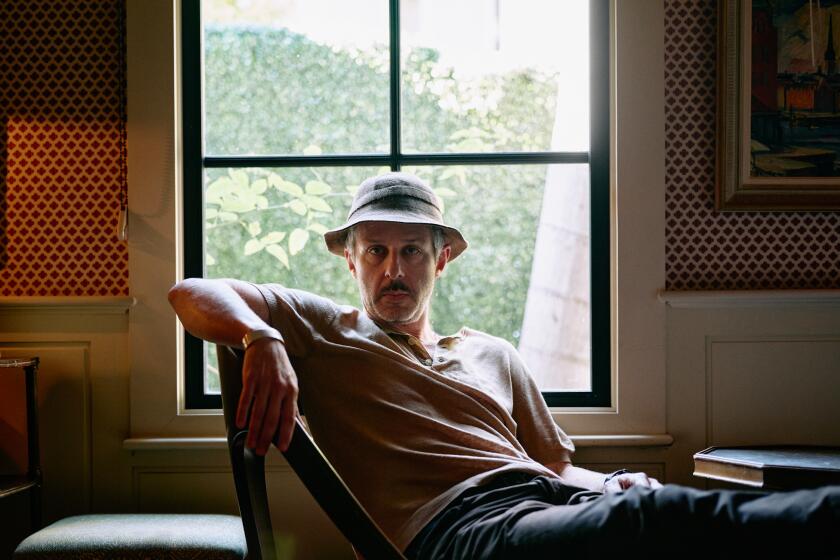Time for a new ‘Vice’
“LOOK, I’m speaking not as a director, but I think I know what most directors want out of life,” says Jamie Foxx when asked about the work of his latest film boss. “They want to be recognized for their style. The minute you see the first frame of a movie that he directs, you go, ‘Wow, that is a Michael Mann flick.’ That is what he has captured on the biggest stage, and that’s what [actors] want to be part of.”
But ask Mann whether his films have a Michael Mann style and he bristles: “Not for me there isn’t. I make films the way I like. I would imagine that, like with any other working filmmakers, when viewed from the outside, you could say, ‘This looks like a Rob Zemeckis film or a Steven Spielberg film. But I don’t go, ‘This is my style.’ It’s not about style.”
What is it about? “Strong stories and strong conflicts,” he says, noting that the ingredients that inspire him have taken forms as varied as the close bond that develops between “60 Minutes” producer Lowell Bergman and tobacco industry whistle-blower Dr. Jeffrey Wigand in Mann’s 1999 Oscar-nominated suspense drama “The Insider,” or the possibilities that emerge when a sexy Daniel Day-Lewis takes the role of Hawkeye in James Fenimore Cooper’s classic “The Last of the Mohicans” (Mann’s adaptation came out in 1992).
Another Mann staple is evident in film after film: his knack for eliciting powerful performances from A-list stars like Russell Crowe and Al Pacino in “The Insider,” Robert De Niro and Pacino in “Heat,” Will Smith in “Ali,” Tom Cruise and Foxx in “Collateral” or Foxx and Colin Farrell in “Miami Vice,” which Universal Pictures opens July 28.
“I just like working with people who are good at what they do,” Mann says. “People who have a strong point of view. Healthy egos. I like that.”
Getting the scene right is important, sure, he explains, but it’s “how you get to that expression that to me is the most rewarding.” He calls it “spontaneous occurrence.” And it’s resulted in coveted recognition for his actors.
“You know his films are going to be nominated for Oscars,” says Foxx, who received an Academy Award nomination for supporting actor in “Collateral” (the same year he won for best actor for Taylor Hackford’s biographical drama “Ray”). “It’s sort of the Michael Mann School. Some people want to graduate from that university and become better actors.”
Foxx should know. He has attended the Michael Mann School three times: first in “Ali,” then “Collateral” and now “Miami Vice.”
When asked if Mann is a perfectionist, the actor thinks a moment, then replies: “He is definitely meticulous. He wants things perfect. He works toward perfection.”
That bent can be quite hands-on. Mann says he often likes to operate the camera himself because “sometimes there are things that you want to capture in a certain way.” Knowing what is coming “two lines of dialogue from now,” he says he can make “micro adjustments” with the camera.
“On high definition, I never turn the camera off so I can get into a rhythm. I usually do extremely long takes. Instead of breaking up a four-page scene, I’ll do the whole four pages and then we’ll do takes.”
His approach has produced films that have generally managed to interest both critics and mass audiences, and “Collateral,” with Cruise playing against stereotype as a steely-eyed assassin, took in $100 million domestically to become his highest-grossing film.
“The Insider” was one of his only box office disappointments, but it received seven Oscar nominations, including recognition for Mann for director and adapted screenplay (with Eric Roth).
Mann’s latest film is based on the “MTV-style” cops series “Miami Vice” that he executive produced in the 1980s. But he stresses that his new film won’t be a rehash of the Crockett-and-Tubbs buddy series that captivated TV viewers two decades ago. Don’t expect pastel cityscapes and undercover cops dressed in Armani jackets over T-shirts. “We wanted to do ‘Miami Vice’ as if it never existed before, do it for real,” he says.
“The way Michael Mann wanted to do it, he made it heavier, darker,” Foxx says. “You don’t really pay attention to the clothes. Actually, a lot of the movie was shot at night.”
When he produced the TV series, Mann recalled, he didn’t set out to create a contemporary look for Miami. That look already existed in the American capital of Latin culture. “Before I went there, I thought ‘Scarface’ was overstated,” he said. “Then I realized that ‘Scarface’ was a marvel of restraint. Miami was a pretty wild place.”
This time around, it was even wilder. During shooting last year in Florida, production on “Miami Vice” was halted for six days because of hurricanes Katrina, Rita and Wilma.
“I mean, it was really an adventure. We had very dramatic weather, to say the least,” Mann says, adding that the cameras took it all in. “We had a lot of shots of great clouds and thunderstorms and lightning flashes.”
The production lost another couple of days down in the Dominican Republic when an off-duty police officer, who was said to be inebriated, pulled a gun and fired his weapon. “A soldier shot him,” Mann recalls, noting that the gunman never actually got onto the set.
At 63, the Chicago-born Mann shows no signs of slowing. “I think it’s easy for directors to stay fresh more than actors, especially once an actor becomes a star. It’s hard for Russell Crowe to walk down a street or take a subway,” he says. “I can fly coach.”
Mann, who often writes his own scripts, once told the Directors Guild of America’s magazine: “Could I have worked under a system where there were Draconian controls on my creativity, meaning budget, time, script choices, etc.? Definitely not. I would have fared poorly under the old studio system that guys like Howard Hawks did so well in. I cannot just make a film and walk away from it. I need that creative intimacy, and quite frankly, the control to execute my visions, on all my projects.”
Spoken like a true auteur.
More to Read
Only good movies
Get the Indie Focus newsletter, Mark Olsen's weekly guide to the world of cinema.
You may occasionally receive promotional content from the Los Angeles Times.










